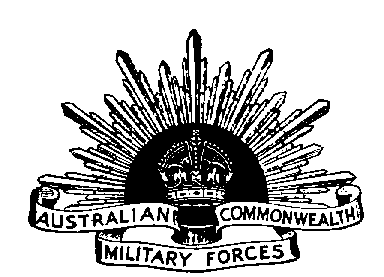

James Campbell Stewart was born on 19 January 1884 at Port Fairy, Victoria, the son of a bank manager. He was educated at Terang High School and became a bank officer.
In 1901, Stewart enlisted in the Victorian Scottish, in which he was promoted to sergeant in 1905 and was commissioned on 29 November 1909. He was promoted to lieutenant on 28 August 1911. Stewart became adjutant and a captain in the 52nd Infantry on 19 August 1912.
Stewart joined the AIF on 17 August 1914 as adjutant of the 5th Battalion. He landed at Anzac with the battalion on the morning 25 April 1915, and was in acting command of the battalion in White Valley, the battalion commander, Lieutenant Colonel D. S. Wanliss having becoming separated from his unit. While bringing up part of the battalion to reinforce the brigade's positions on the 400 Plateau, Stewart was wounded by shrapnel at around 3pm. He was subsequently evacuated to Egypt.
Stewart returned to the 5th Battalion on 2 June 1915 and remained with it it until the evacuation of Anzac. For his services at Gallipoli, Stewart was awarded the Distinguished Service Order (DSO).When the AIF was enlarged in Egypt in February 1916, a new battalion, the 57th, was created from half of the 5th Battalion. Stewart was chosen to command it and was promoted to lieutenant colonel on 12 March 1916. His new brigade commander, Brigadier General H. E. Elliott wished to replace his other three battalion commanders with younger men, but was apparently satisfied with Stewart. His men agreed, nicknaming their commander "Whiz Bang".
While he was leading the 15th Brigade advance Column in the pursuit of the Germans to the Hindenburg Line, Elliott left the remainder of the brigade under Stewart's command, acting a division reserve.
For his services at Beaumetz, Stewart was made a Companion of St Michael and St George (CMG). His citation read:
This officer was in command of the outposts of the 5th Division Advanced Guard from 8pm 22 March 1917 to midnight 26 March 1917. On night 23-24 March the enemy attacked Beaumetz with strong forces under the cover of a heavy bombardment.
After a stubborn fight the enemy who were specially selected and trained for the operation was driven out with losses in killed alone more than double the total number of our casualties. The success of the operation was largely due to the organisation of the outpost line by Lieutenant Colonel Stewart and his skilful handling of the supporting companies.
During the night of 24-25 March 1917 Lieutenant Colonel Stewart organised an attack by the 57th Battalion a strong point held by the enemy 600 yards from out line north of Beaumetz. The post was captured and held against a subsequent bombing counter-attack. Its possession gives our troops a most valuable post for observing hostile movements.
With conspicuous energy and determination Lieutenant Colonel Stewart has caused our outpost line to be converted into a strong line of defence.
At Polygon Wood on 25 September 1917, Elliott received the disquieting news that a German counterattack had struck the British formation on his flank. Elliott's immediate move was to send Stewart forward with the 57th, with all the brigade's machine guns at his disposal. Stewart relieved Lieutenant Colonel N. Marshal of responsibility for the flank, allowing Marshall to proceed with the original plan of attack for the battle the next day. In the event, the 15th Brigade captured both their own objective and that of the troops on their flank. Stewart was awarded a bar to his Distinguished Service Order (DSO). Elliott wrote in his citation:
Colonel Stewart, in the most unselfish and loyal manner, thus sacrificed a large number of his battalion for the benefit of those in front of him, although he was aware that his battalion might itself have to take up the advance at any time. His loyal support to the different battalions of this brigade.. was in very great measure the cause of our success. For this spirit, Colonel Stewart is largely responsible... throughout this year this officer -- at Barley Trench, Beaumetz and Bullecourt -- had a very great deal to do with the success of the brigade in action. his courage and devotion to duty is worthy of ... special recognition.
Stewart was acting commander of the 15th Infantry Brigade while Elliott was on leave in March 1918, and on 3 April 1918 he was given command of the 14th Infantry Brigade. Stewart led the 14th Infantry Brigade through the final campaigns. In both defence and offence his leadership was cool and reliable. In all, he was mentioned in dispatches five times.
After the war Stewart commanded the 14th Infantry Brigade from 1 February 1920 to 30 April 1921, the 10th Infantry Brigade from 1 May 1921 to 30 April 1926 and the 15th Infantry Brigade from 1 March 1930 to 28 February 1934. He was honorary colonel of the 57th Battalion from 31 January 1929. During World War II, he commanded the Volunteer Defence Corps, the Australian version of the Home Guard, in Melbourne from 1942 to 1945.
He died on 2 June 1947 and was cremated.
Sources: Australian Dictionary of Biography, 1899-1939, Vol 12, pp. 88-90; Bean, C. E. W., The Official History of Australia in the War of 1914-1918. Volume I: The Story of Anzac pp.382, 399-402, Volume III: The AIF In France 1916, pp. 147-148, 172-175; Volume IV: The AIF In France 1917, pp. 153, Corfield, Hold hard Cobbers, p. 89
Page created by Ross
Mallett
ross@metva.com.au
Last update 15 September 2001